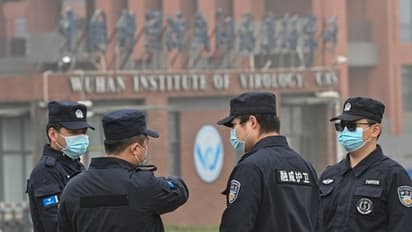Leak from Wuhan lab region 'more likely' as origin of COVID: Canadian biologist to UK Parliament

Synopsis
When asked about the likelihood of a lab leak being the cause of the pandemic, Chan stated that a "lab origin is more plausible than natural origin at this moment."
A cross-party members of Parliament on the House of Commons Science and Technology Committee was advised by a Canadian molecular expert that a leak from a facility in China's Wuhan region is now the "most conceivable" cause of the COVID-19 international epidemic. Dr. Alina Chan, a gene therapy and cell engineering specialist and co-author of 'Viral: The Search for the Origin of COVID-19,' told a Parliament panel hearing scientific research evidence that the pandemic was triggered by a specific characteristic of the coronavirus known as the "furin cleavage site." It is associated with the Wuhan Institute of Virology. When asked about the likelihood of a lab leak being the cause of the pandemic, Chan stated that a "lab origin is more plausible than natural origin at this moment."
She stated that everyone agrees that a catastrophic occurrence occurred at the Huanan Seafood Market, a superspreader event caused by people. She said that there is no evidence pointing to the virus's natural animal origin at that market. When asked if she was confident that the world would ultimately discover the actual origins of COVID-19, Chan responded it was only a matter of time. She also stated that it is now unsafe for anyone who knows the cause of the epidemic to come forward. It may be five years or fifty years from now, but we live in a time where so much data is being collected and preserved.
"
Concerning whether the virus was changed in the lab before the breach, Chan stated that they have heard from many top virologists that a genetically engineered origin of this virus is feasible, including virologists who developed the initial SARS virus. She claims the virus possesses a one-of-a-kind trait known as the furin cleavage site.
Her co-author, Lord Matt Ridley, was also questioned about the lab leak scenario, and he agreed with Chan that it was "more probable than not" the source of the epidemic.
Ridley and Chan agreed that any leak was most likely an "accident" when he recounted scientists' travel a few years ago to bring SARS-like viruses back to Wuhan for studies.
Also Read | First case of COVID identified in Wuhan was days later than previously reported: Reports
According to the World Health Organization, Richard Horton, Editor-in-Chief of 'The Lancet,' the lab leak idea underlying COVID-19 is a "hypothesis that has to be taken seriously and examined further" (WHO). The evidence session is part of the Science and Technology Committee of the UK Parliament's enquiry into "reproducibility and research integrity," which is slated to release its conclusions in 2022.
Check the Breaking News Today and Latest News from across India and around the world. Stay updated with the latest World News and global developments from politics to economy and current affairs. Get in-depth coverage of China News, Europe News, Pakistan News, and South Asia News, along with top headlines from the UK and US. Follow expert analysis, international trends, and breaking updates from around the globe. Download the Asianet News Official App from the Android Play Store and iPhone App Store for accurate and timely news updates anytime, anywhere.